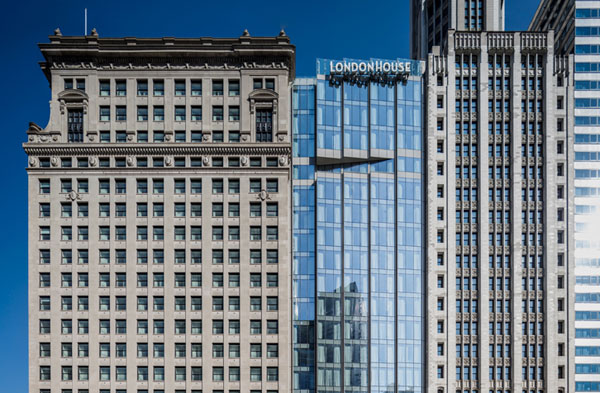✕

Column: industry Tag: hotel platform,Oxford Capital, Oxford Hotels Published: 2017-12-11 15:00 Source: Author:

The LondonHouse in Chicago was developed by Oxford Capital and has retail space on its first two floors. (Photo: Oxford Hotels & Resorts)
CHICAGO—Oxford Capital’s mission when it comes to hotels is simple: optimize the value of the real estate.
Through its wholly owned affiliate Oxford Hotels & Resorts, the company specifically looks for value-enhancing opportunities including, but not confined to, mixed-use projects. John Rutledge, founder, president and CEO of the Chicago-based company, said the philosophy has led to a strong portfolio of hotels along the East Coast from Boston to Florida and the upper Midwest. It is also entering Southern California.
“We’ll take advantage of spot market opportunities to acquire, to develop, to reposition, to manage and to grow in a disciplined manner,” Rutledge said. “We’ve got a significant portfolio of existing assets, we have six or eight projects under development or redevelopment at any given time, and then we’re constantly trolling for new opportunities. … We very much have a national approach.”

John Rutledge,
Oxford Capital
Oxford’s portfolio includes branded, soft-branded and independent hotels. It’s the latter segment that dominates its roster, which includes Essex Inn, Julian, LondonHouse, The Godfrey, Felix, Bay Harbor and Cass as its self-branded indie hotels.
“Our DNA as a firm is as a disciplined investor developer; it isn’t about ‘I want to have X number of hotels or X number of Godfreys or LondonHouses by a certain date,’” he said. “It’s about where can we sponsor smart real estate investments and wrap our brand family around them to value optimize the real estate.”
There are two Godfrey properties open and one under construction. The company has one LondonHouse open—a 23-story hotel in Chicago’s Loop that formerly was the London Guarantee & Accident Building before Oxford redeveloped it and added a glass tower adjacent to it. The property opened in 2016.
Most of Oxford’s transactions are relatively large-scale, urban lifestyle anchored real estate investments, according to Rutledge. They might be exclusively hotels, but many times projects include hotels with retail or hotels with parking and retail.
The attraction of such deals lies in the optimization of real estate. In many cases, it is about underutilized land, Rutledge said. He cited the Essex on the Park development on Michigan Avenue in Chicago, a lifestyle hotel with retail plus a 500-unit luxury apartment building, as a prime example of Oxford’s approach. Part of the project is being built on the site of a former parking garage.
“Because we tend to focus on the top 10, and to some degree top 20 cities, and pretty urban, it’s not at all unusual for the first two floors to have retail (space),” Rutledge said. “By definition, if you have retail on a floor or two in a hotel, you have a mixed-use project. So I would say many of them have mixed-use elements, but it isn’t automatic that it has to be mixed use.”
Oxford’s hold period varies by property, Rutledge said.
“We’ve had assets that we’ve had for almost 15 years, and we’ve had assets that we’ve sold within two years. It’s really a wide range,” Rutledge said. “We look to harvest value, generally within a three- to five-year period or three- to seven-year period. Whether that’s harvesting through a refinance or a leveraged equity and debt recapitalization or a sale or a sale leaseback, those are all harvest events.”
The company’s optimal scenario is to acquire, develop and/or redevelop, create value, harvest that equity value creation, and yet stay attached to the property long term as the manager and/or brand, he said.
The company is also doing more third-party management work as a natural extension of being an integrated sponsor, he said.
“Acquisitions, development, investment, management … we like being a one-stop shop, an integrated sponsor,” Rutledge said. “We’re better managers because we’re owners; we’re better owners because we’re managers.”
Starting with a contrarian view
Rutledge, a graduate of the University of Michigan who started Oxford at age 24, said he entered the hotel sector as a contrarian play. Oxford’s affiliates and principals have been involved in approximately $2.5 billion of real estate and private equity investments, including approximately 13,000 hotel rooms and more than 2,000 assisted living units and nursing home beds.
“In the early ‘90s when, frankly anything having to do with real estate was black-marked because it was overbuilt, overleveraged,” Rutledge said. “Hotels I always viewed as a hybrid asset class—part real estate, part operating business.”
The higher volatility of hotels and the daily rental business was attractive to Rutledge—even if dealing with the faster upturns and downturns can cause headaches and stress, he said.
“We’ve acquired, developed, and/or invested across three cycles—the (savings-and-loan) crisis of the early ‘90s, the dot-com bubble and 9/11 crisis in 2001, and then the Great Recession in 2008,” Rutledge said. “We generally acquired, developed, repositioned at deep discounts to replacement cost, and then ridden the growth in the economy and then the re-liquification of the capital markets up, and then we’ve either refinanced, sold or executed leverage recapitalizations at or near higher cycles or higher points in the cycle. And then we get pretty defensive again.”
The CEO’s current state of mind is set on “cautious.”
“We’re quite cautious about acquiring and/or developing, and/or redeveloping hotel real estate right now,” he said. “There may still be a few spot market opportunities in key markets where there are multivariable elements that we think make sense, but we view it as more of a spot market opportunity than a secular opportunity.”
All of this requires a high risk-reward tolerance to be successful in the hotel industry, Rutledge said.
“Real estate is higher beta, and hotels are maybe the highest beta of real estate,” he said. “Therefore, when people ask if hotels are a good business to invest in, I say, ‘Sometimes yes, sometimes no.’ It is not a blanket statement.”
Previous:U.S. Hotel Stocks Up 5.0 Percent for November 2017
Next:Peninsula Papagayo To Develop Luxury Oceanfront Villas Managed By Four Seasons Hotels And Resorts
Hot key words
Hot Products
Popular Vendors